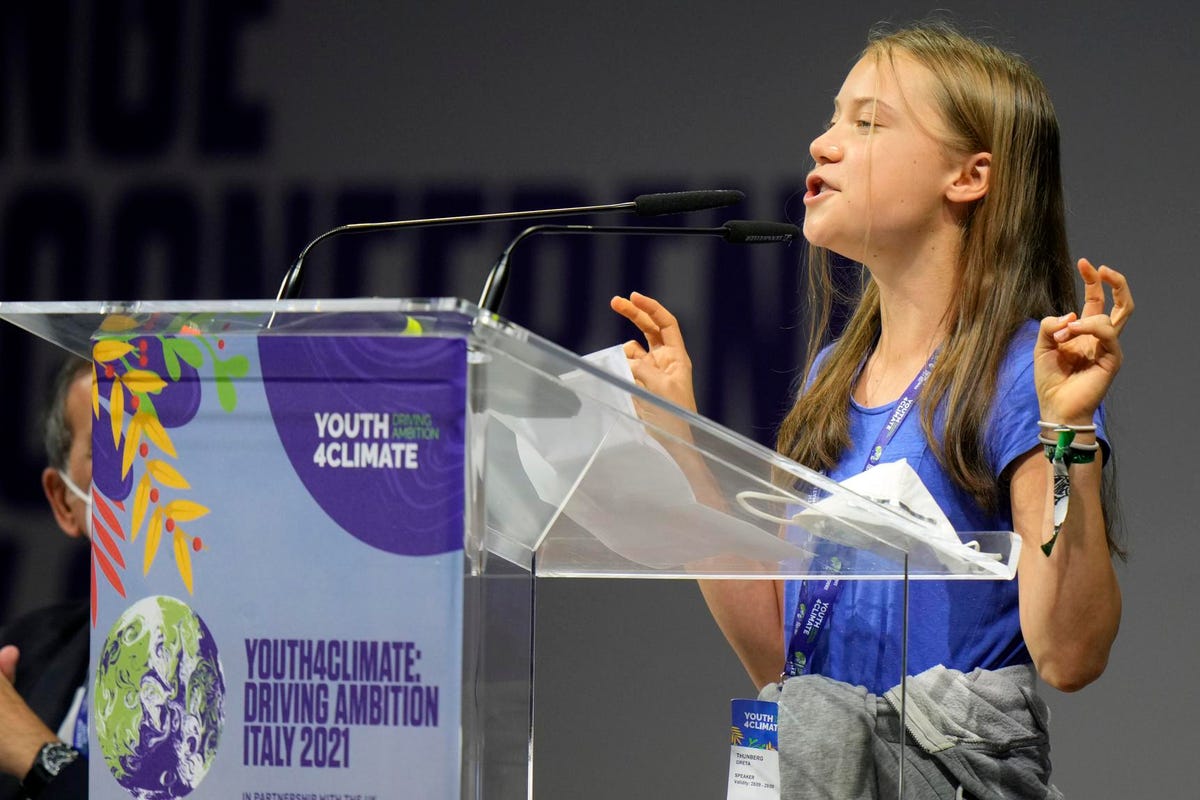
“Green economy. Blah blah blah. Net zero by 2050. Blah, blah, blah” Swedish climate activist Greta … [+]
Greta Thunberg, the Swedish climate activist has addressed the Youth for Climate summit and accused governments of saying many ‘fine words’, but highlighting the climate ‘does not lie’.
The conference was held just one month before Cop 26 hosted by the United Kingdom in Glasgow. It will be the 26th UN Climate Change Conference of the Parties (COP26) and runs from 31 October – 12 November 2021.
Unsurprisingly many businesses are making corporate announcements in the run up to COP26 on ESG (Environmental, Social, and Corporate Governance) policy. But will words equal action at pace, or as Thunberg suggests – is there an element of ‘Blah, Blah, Blah’
Covid-19 has jolted social consciousness for the consumer and retailers must play a pivotal role in making drastic change to give the customer easy and convenient ways to shop more sustainably.
Marks & Spencer’s have announced an urgent reset of their “Plan A” environmental commitment with a singular focus; giving a detailed roadmap to becoming a net-zero, Scope 3 business across its entire supply chain and products by 2040.
For those unsure what Scope 3 actually means – The Carbon Trust explains the categorisation for greenhouse gas emissions as follows: Scope 1 is direct emissions from owned or controlled sources, Scope 2 is indirect emissions from the generation of purchased electricity, steam, heating and cooling – and Scope 3 includes all other indirect emissions that incur in a companies value chain – eg. purchased goods and services.
MORE FOR YOU
This would see the retailer achieve full net zero, 10 years ahead of the government’s national strategy, an ambitious target which will require rapid decarbonisation across all operations.
CEO Steve Rowe admits that the road ahead “won’t be easy” but the fashion and food retailer is bringing climate change issues to the forefront in all aspects of the business. Bringing employees on the journey with “Carbon Champions”, working with suppliers to reduce emissions and a “look behind the label” campaign to help consumers understand the products they are buying.
Rowe also commits to delivery by stating that this pledge from Marks & Spencer “ is not a far-away promise.”
Supermarket giant Tesco, in partnership with Loop have launched a trial of it’s zero-waste shopping service in 10 stores in the east of England, enabling consumers to buy common household goods in reusable packaging that can be returned to stores to be used again.
The service includes products such as tomato ketchup, washing up liquid and soft drinks with the aim of allowing consumers to return and reuse packaging to reduce the demand for single-use plastics. The retailer estimates that if customers switch just three products in their weekly shop,packaging would be used and reused more than two-and-a-half million times a year.
The reuse and refill concept is far from new and many smaller independent retailers have been leading the way in zero/low waste shopping for many years, offering consumers options to shop more sustainably. It is believed there are approximately 320 independent zero/low waste stores across the UK.
Mr Whetstone, a small independent low-waste shop in Saltaire, Bradford. Founder, Anna Claridge set … [+]
One such store is Mr Whetstone, a small independent low-waste shop in Saltaire, Bradford. Founder, Anna Claridge set up the business in response to what she felt was ‘mounds of unnecessary packaging at high street stores’ and ‘higher cost of shopping sustainably’. As well as wanting to give consumers affordable options to shop in an environmentally friendly and plastic free way, Claridge wants to support and educate customers on a greener shopping journey.
Fortnum & Mason has announced the launch of a pop up restaurant FIELD by Fortnum’s that will … [+]
Luxury retailer, Fortnum & Mason has announced the launch of a pop up restaurant FIELD by Fortnum’s that will celebrate British producers on a specially curated menu with sustainability and seasonality at the heart. Each dish is designed around daily sourced produce and ingredients from UK suppliers. After the food has been cooked, the excess is weighed and reported every day in the retailers effort to reduce waste by turning it into other dishes such as soup. Items from the shop floor that aren’t fit for sale but perfectly consumable will be used in the menu too.
The concept even stretches to the restaurants interiors with the decor made from reused and repurpose up-cycled furniture, crockery and packaging.
Iconic fashion brand, Ralph Lauren has been handpicked by non-profit organisation, Global Fashion Agenda to join its group of Strategic Partners, with the aim of leading the industry into a more sustainable future.
Global Fashion Agenda recognised Ralph Lauren’s current sustainable efforts, giving the corporate an active role in the development of the its thought leadership platform.
Earlier this year, Ralph Lauren reinforced its global commitment to sustainable operations with a new environmentally focused roadmap aiming to achieve net zero global greenhouse emissions by 2040.
“I would love the legacy of this company to be not only the beautiful products we made but the way we thought about the world and tried to make it a better place.” explains founder, Ralph Lauren.
Whilst these are all positive steps in the right direction, will consumers and activists think it is enough? Reaching climate change goals and net zero targets needs support from both retailer, supplier network and consumer – and one of the biggest opportunities is how consumer and retailer work together on the supply and demand.
As Thunberg says “ we need constructive dialogue” and this should be between consumer and retailer too.




